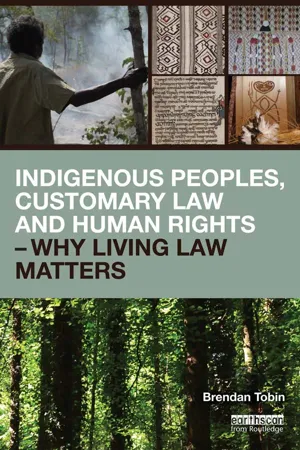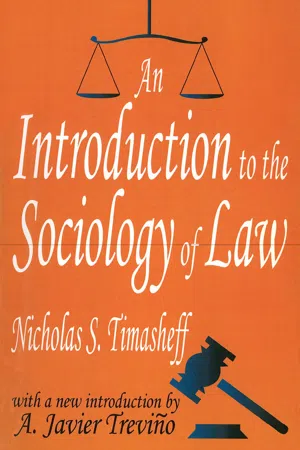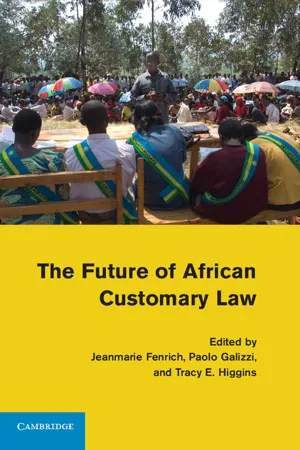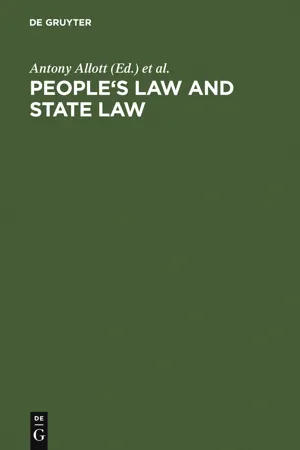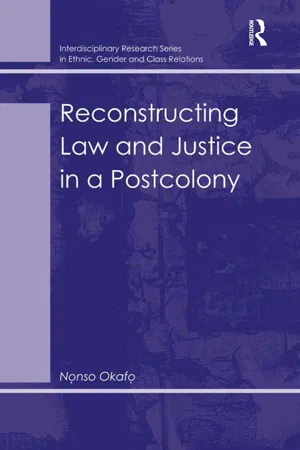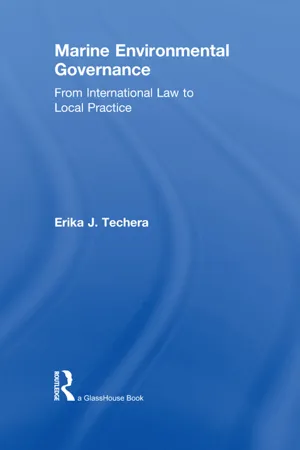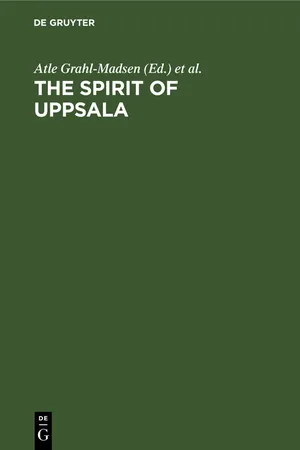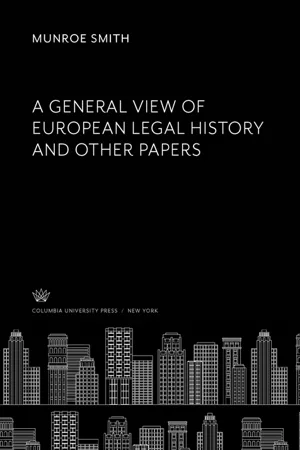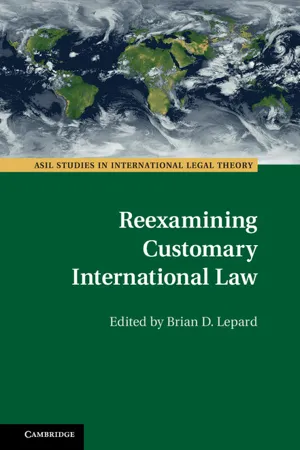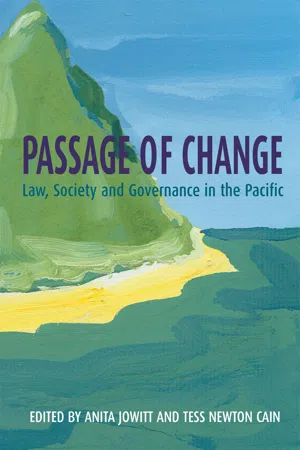Law
Customary Law
Customary law refers to a body of unwritten traditions and practices that have been accepted and enforced within a particular community over time. It is based on the customs and norms of a specific culture or society and is often passed down orally from generation to generation. Customary law can coexist with, or in some cases, even take precedence over statutory law within certain communities.
Written by Perlego with AI-assistance
11 Key excerpts on "Customary Law"
- Brendan Tobin(Author)
- 2014(Publication Date)
- Routledge(Publisher)
1 Customary Law in contextAs humans began to band together the emergence of systems of incentives such as security, access to food and companionship, and of sanctions including violence and expulsion, will have proven necessary to ensure cohesion of larger social groupings. Through habitual practice these customs came to define the nature of social relations and to be viewed as obligatory. Custom was the primary building block for normative development whether by family groupings, tribal and Indigenous peoples, local communities, and later city states or nations. When habitual customs become customary conventions and obligatory rather than merely persuasive is at the heart of determining when custom becomes Customary Law.1Human society its survival and development depends upon the capacity to establish social structures providing the structure for realization of our natural instincts for society, security and procreation. Nature having provided these instincts needed to provide humans with the means to temper individual demands for their satisfaction in order to secure collective wellbeing. The notion that nature inscribed humankind with such internal ordering is at the basis of western theories of natural law, which viewed natural law as the source of universal truths common to all. Natural law is a key source of law for Indigenous peoples, their notion of natural law is, however, somewhat distinct. Indigenous peoples tend to see natural law as the law of nature, which is to be observed and complied with if the Earth is to sustain us. Viewed from this perspective, natural law is a guide on how to relate to nature and underlies notions of reciprocity between humans and the Mother Earth. Natural law is not of itself binding and its enforcement is dependent upon Customary Law and positive law. For some natural disasters and harms arising from disruption of life forces of nature may be seen as the cost of failure to comply with natural law.- eBook - ePub
- Nicholas Sergeyevitch Timasheff, A. Javier Trevino(Authors)
- 2017(Publication Date)
- Routledge(Publisher)
a , 383).Customary Law is not limited to the first stages of legal development, but continues to play a part even in “mature law.” Pareto is right when he says: “Customary Law is not merely primitive; it goes hand in hand with positive law, creeps into jurisprudence and modifies it. Then the day comes when the theory of such modifications is formulated and positive law opens a new chapter” (176). Yet so long as statute law has not been changed, “customs can never be set up” (Allen, 89). Of course, in practice sometimes they are (chap. XV ).6§ 5. THE CORRELATION OF LEGAL ORDERS
It may seem that the facts discussed in the preceding sections are of no sociological value. Yet they are. They can be expressed in the following proposition: the relative force of a legal rule (i.e., its ability to determine human behavior) is the higher the nearer is its point of origin to the kernel of the power center.7 The sociological importance of the proposition is obvious; it forms certainly additional evidence for the proposition that, sociologically, law is the overlapping part of ethics and of power, for, if this basic proposition is correct, the relative force of legal rules must be proportional to the distance of their point of origin from the highest power center.Let us now continue the study of the differentiation and integration of law. Different legal orders are superimposed each over another. Taken together, they are all imposed upon men. This is, of course, a heavy burden. The behavior of everyone is determined by the totality of the orders: one moment one has to act with a regard for a rule of statute law, the next moment according to a rule of Customary Law and then possibly according to a collective contract recognized by the group to which one belongs. This multitude of legal orders is generally not consciously realized and not felt by individuals. The interweaving of the different grades and types of law is such that it permits individuals to behave as if there were only one order. This interrelation of rules derive from the principle of the hierarchy of legal orders, which prevents and adjusts conflicts within the system. - eBook - PDF
- Jeanmarie Fenrich, Paolo Galizzi, Tracy E. Higgins(Authors)
- 2011(Publication Date)
- Cambridge University Press(Publisher)
There may be a perception that the portions of a Customary Law that one disapproves of are structurally inseparable from the entire edifice, and maintenance of the existing law may reasonably be seen as preferable to its total destruction. Today the Customary Laws are often appreciated as inextricable parts of the local, indigenous cultures that are the basis of members’ identities. 1.3.2. Customary Laws Are Complex Bodies of Norms That Have Different Degrees of Mandatory Force A certain stereotypical analysis of law says that each legal system consists of a self- consistent body of imperative rules stipulating what must or must not be done. It is 9 Chinua Achebe, No Longer at Ease (Heineman 1960); S. N. C. Obi, The Customary Law Manual: A Manual of Customary Laws Obtaining in the Anambra and Imo States in Nigeria, para. 285 (Ministry of Justice, Anambra State 1977) (Nigeria). 10 See Martin Chanock, Making Customary Law: Men, Women and Courts in Colonial Northern Rhodesia, in African Women and the Law: Historical Perspectives (M. J. Hay & M. Wright eds., Boston University African Studies Center 1982); Kiye, supra note 6, at 98–101. Woodman 14 often added that sanctions must be prescribed for every case of non-compliance. 11 In practice, however, the norms of Customary Laws in Africa vary in the degree to which they are compulsory. Thus, for example, a Customary Law may permit a head of fam- ily to allocate the enjoyment of family resources, such as accommodation in a family house, but disapprove a refusal to allocate to a family member thought to be deserv- ing, and more strongly disapprove an allocation to a non-member. The sanctions for failure to observe the norms may vary from a severe publicly imposed penalty, through a requirement to explain and justify an act and apologize if the explanation is thought unsatisfactory, or a liability to lose formal or de facto authority, to criti- cal gossip and a loss of respect. - eBook - PDF
People's Law and state law
the Bellagio papers
- Antony Allott, Gordon R. Woodman, Antony Allott, Gordon R. Woodman(Authors)
- 2011(Publication Date)
- De Gruyter Mouton(Publisher)
The definition would be limited to the context of a rule which would either be part of lawyers' Customary Law or belong to sociologists' Customary Law. Similar arguments could be developed for the other terms mentioned, and for any others. (On marriage, see Woodman 1977: 129-130). It seems more likely that some principles of the two systems of Customary Law may coincide, although not all. The term is used here in Dworkin's (1977a) sense. Principles of law, like rules of law, are legal standards, but unlike a rule, a principle relevant in any given case argues in one direction, but does not necessitate a particular decision, and carries weight, requiring that it be taken into account in reaching a decision, without being binding in all-or-nothing fashion. (Dworkin 1977a: 22-28 and generally Chap. 2.) Principles generally prescribe less specific acts than rules (Christie 1968; Raz 1972), and lie behind rules, providing common justifications for groups of rules (Dworkin 1977a: 66, Chap. 4.) 21 (Norm is used throughout this paper to include both rules and principles.) I suggest that a principle of both systems of Customary Law in both Ghana and Nigeria is that a person who develops land ought to be secured the fruits of his investment. Another is that individuals who belong to the same social group ought to behave towards each other in a manner which will promote the social cohesion of the group. On the other hand it is doubtful whether there are in sociologists' Customary Law principles advancing the authority of the state, national integration, and national economic development, while there probably are in state law, including lawyers' Customary Law. Moreover, even when principles with the same content are found in both systems, it is likely that their weights will differ. - eBook - ePub
- Nonso Okafo(Author)
- 2016(Publication Date)
- Routledge(Publisher)
The unjustifiable dichotomy between “superior” and “inferior” legal systems need not continue. There is no rational basis or evidence to argue scientifically that Western law is superior to other societies’ Customary Laws. Moreover, the English common law, which highlights Western law, is based on the English traditions, customs, and native laws, which constitute the same foundation for Customary Law. However, the claim that Customary Law is inferior to Western law derives from an inaccurate sense of traditions, customs, and native laws (Customary Law). The correct position is that Customary Law is a system of laws based on the indigenous cultures, religion, practices, consensus, aspirations, etc. of a society. The Customary Law of a postcolony or conquered territory must be distinguished from the system imposed by the colonizing or conquering power. Thus, “Customary Law” in this book separates a society’s indigenous, home-grown law and justice system from an imposed system.Without an extensive excursion into rural versus urban criminology, this chapter identifies key distinguishing variables of a rural society and an industrial society. Some of the limits and limitations of a justice system are inherent, while others attach from the environment. Whether they are inborn or acquired, all the variables contribute significantly to the effectiveness and efficiency of the Customary Law of each society. However, the basic argument here is that, whereas rural and industrial societies differ in their justice characteristics, they may be assessed on effectiveness and efficiency if the assessment is based on what reasonably works for each society (effectiveness) and the cost involved (efficiency). This chapter uses Restorative Justice principles to illustrate traditions, customs, and native laws’ (Customary Law) contributions to social control, justice, and law in a modern State.Judging a Justice and Social Control System on Effectiveness and Efficiency
A viable and sustainable justice and social control system must be both effective and efficient. Otherwise, it will be discarded, sooner or later. The credibility of a justice and social control system depends on whether or not its human subjects perceive the system as effective and efficient. A system based on Customary Law, the English Common Law, Constitutionalism, Religious Law, or any other philosophy, has to be effective and efficient to be sustained over a long period of time. I will now illustrate the roles of the twin considerations (effectiveness and efficiency) with a brief consideration of their applications to traditions, customs, and native laws (Customary Law). - eBook - ePub
Marine Environmental Governance
From International Law to Local Practice
- Erika Techera(Author)
- 2013(Publication Date)
- Routledge(Publisher)
et al. , op. cit., p xii, where Customary Law is defined as comprising ‘those sets of rules, established through the process of socialization, that enable members of a community to distinguish acceptable from unacceptable behaviour’.34 T Bell, ‘Polycentric law’ Humane Studies Review 7 (1), 1991/2. Online: http://osf1.gmu.edu/~ihs/w91issues.html (accessed 30 December 2010); G Powles, ‘Common law at bay’, Journal of Pacific Studies 21, 1997, 61–82. See also A Cromartie, ‘The idea of common law as custom’, in Perreau-Saussine, A and Murphy, JB (eds) The Nature of Customary Law , Cambridge: Cambridge University Press, 2007.35 P Karsten, Between Custom and Law: “High” and “Low” Legal Cultures in the Lands of the British Diaspora – the United States, Canada, Australia, and New Zealand, 1600–1900 , Cambridge: Cambridge University Press, 2001, p 4.36 D Hunter et al. , International Environmental Law and Policy , New York: Foundation Press, 2007 (3rd edn), p 315.37 Powles, op. cit., p 67.38 Bracey, op. cit., p 33.39 New Zealand Law Commission, op. cit., p 46.40 Mabo v Queensland (1992) 175 CLR 1, 61 and 70.41 Benda-Beckmann and Benda-Beckmann, ‘The dynamics of change and continuity in plural legal orders’.42 See, eg, Hertogh, op. cit., in which he refers to E Ehrlich, Fundamental Principles of the Sociology of Law , New York: Russell and Russell, 1962. Hertogh goes further and sets out four fields of non-state law: p 22.43 For example, finance and economics.44 Benda-Beckmann and Benda-Beckmann, ‘The dynamics of change and continuity in plural legal orders’.45 See, eg, RE Johannes, ‘Traditional marine conservation methods in Oceania and their demise’, Annual Review of Ecological Systems 9, 1978, 349–64.46 New Zealand Law Commission, op. cit., p 47.47 Ibid.48 Brown, op. cit., p 3.49 Ibid, p 5. It has also been noted that the system of indirect rule by the British increased the power of the chiefs: D Paterson and SA Zorn, ‘Fiji’, in Ntumy, MA (ed), South Pacific Islands Legal Systems - eBook - PDF
The Spirit of Uppsala
Proceedings of the Joint UNITAR-Uppsala University Seminar on International Law and Organization for a New World Order (JUS 81) Uppsala 9–18 June 1981
- Atle Grahl-Madsen, Jiri Toman(Authors)
- 2019(Publication Date)
- De Gruyter(Publisher)
g., the socialist countries have regarded treaty law as the primary source of international law. Today, against the background of the statutes of international organizations and the law-making conventions which have been concluded since 1945, there seems to be a certain consensus on the primacy of treaty law. Still, Customary Law can be viewed quite differently in different countries. For instance, in Finland, a country which has been rather isolated from the mainstreams of international relations and where the discipline of international law does not play a primary role in legal traditions, a lawyer invoking a norm of customary international law in a lower court would probably be regarded as an odd figure. If he would succeed in convincing the judge that such a norm (and Customary Law in general) really exists the judge might take refuge in the principle of dualism and refuse to apply the norm on the basis that it has not been transformed into Finnish law. 28 Speaking on a general level, the function of Customary Law may be viewed from at least three different angles: 1. The reference to Customary Law in a concrete dispute. This includes the case when an international dispute-settling organ is called upon to State the content of a customary norm (The interpretation of international law). 2. The day-to-day application of Customary Law by subjects of international law. Innocent passage takes place and diplomats enjoy immunity even if the State in question has not ratified the 1958 Geneva Convention or the 1961 Vienna Convention (The application of international law). 3. The notion of Customary Law as a constitutional law of international rela-tions (particularly Customary Law of a ius cogens nature) and as a bond tying the 26 On this rule see, e. g. Haraszti, Gyorgy, Some fundamental Problems of the Law of Treaties. - Munroe Smith(Author)
- 2019(Publication Date)
- Columbia University Press(Publisher)
The making of law belonged to Parlia-ment. This theory is not, however, now taken very seriously even by the courts, and English and American writers gen-erally discard it. The facts that English common law has never had any existence except in decisions; that by decisions it has been developed in historical times from scanty begin-nings into a great and complex system; that by decisions its rules have continually been modified and frequently over-ruled, — these facts have been more cogent to the average mind than any official theory. Although English common law has frequently been styled the custom of the realm 48 it is not now usual to call it Customary Law. It has always rested, however, like all the customary or unwritten law we have been examining, upon the persistent practice or custom of the law-finders. It is, however, frequently asserted, by those who frankly recognize the law-making power of judicial decisions, that each decision in which an old rule is modified or a new rule is laid down makes law; that it is not the current of decisions 48 Cf. Pollock, First Book of Juris prudence, pp. 239-243. Customary Law 299 or judicial practice that determines unwritten law any more than it is legislative practice that determines the written law. Under this theory, of course, English common law could not properly be termed Customary Law. The discussion of this point will be deferred until we come to consider the general relation that exists between law and the interpretation -of law. OFFICIAL LAW OR EQUITY The Roman distinction between citizen's law ( ius civile) and official law ( ius honorarium) and the equivalent German distinction between Volksrecht and Amtsrecht do not cor-respond with the distinction which I have attempted to draw between non-governmental and governmental law-finding. The substitution of governmental for popular agencies in ordinary law-finding usually involves no abrupt breach with the past.- eBook - PDF
Legal Dissonance
The Interaction of Criminal Law and Customary Law in Papua New Guinea
- Shaun Larcom(Author)
- 2015(Publication Date)
- Berghahn Books(Publisher)
While there are many common principles to Customary Law across Papua New Guinea there are also many differences, especially as some ethnic groups have a reputation for expecting higher compensation payments or for more readily using violence than others. The second practical dif-ficulty relates to what is actually meant by ‘custom’ or Customary Law. Customary Law and the State Criminal Law • 51 Customary Law is a contested concept, not only for academics but also for those trying to apply it on the ground, particularly as it is often ‘rein-vented’ and ‘recreated’ in Melanesia (Forsyth 2009: 78). Customary Law is influenced by interactions with the state legal order and other import-ant influences, particularly religion. Many Papua New Guineans have taken to Christianity and it would seem that it is now a far more reli-gious society than from where the first missionaries came. In many parts, Christian principles have become firmly embedded in, and intertwined with, what is considered local Customary Law. 62 Often village courts apply local social norms and standards, rather than ‘traditional’ Customary Law which is seen by some in the community, especially the Western-educat-ed local elites, as being at times outdated and uncivilized. The third issue that village courts face is one of legitimacy. In most of the communities I visited it was the local councillors, church leaders, clan heads, and chiefs who played the key role in mediating or sanctioning settlements between disputing groups, rather than the village court system. Often the local village court would be bypassed or be non-operational. Given the weak-ness of the state and the lack of support, if village court magistrates do not derive their legitimacy from customary sources or if they deliver judgements outside community expectations, the ability to enforce their judgements or settlements is severely limited. - eBook - PDF
- Brian D. Lepard(Author)
- 2017(Publication Date)
- Cambridge University Press(Publisher)
4 Committee on the Formation of Customary International Law, American Branch of the International Law Association, “The Role of State Practice in the Formation of Customary and Jus Cogens Norms of International Law,” Proceedings and Committee Reports of the American Branch of the International Law Association 102 (1987–88), 111. 5 Michael Wood, Special Rapporteur, “First Report on Formation and Evidence of Customary International Law,” UN Doc. A/CN.4/663 (2013), para. 36. Customary International Law and General Principles 133 133 5.2 CONCEPTUALIZING THE RELATIONSHIP BETWEEN Customary Law AND GENERAL PRINCIPLES The notion of general principles is indeed “ambivalent” 6 or “polysemic.” 7 In particular, the concept of general principles refers to both a source of international law and a particular norm type in terms of legal theory. I dis- cuss each of these in turn. 5.2.1 General Principles of Law as a Source of International Law Sources of international law can be defined as the “processes by which inter- national legal norms are created, modified, and annulled.” 8 The doctrine of sources of international law determines the particular forms in which interna- tional law is created and can be ascertained. 9 Article 38(1) of the Statute of the ICJ (“Statute”), 10 which literally only identifies the legal norms that the Court “shall apply,” is generally understood to codify the sources of international law. 11 Besides “international conventions,” Article 38(1) of the Statute recog- nizes two sources of unwritten international law: “b. - eBook - PDF
Passage of Change
Law, Society and Governance in the Pacific
- Anita Jowitt(Author)
- 2010(Publication Date)
- ANU Press(Publisher)
30 Customs are not written down in the way that laws are written down, so customs can, and do, change more easily than laws can. Customs are nothing more than beliefs, values and habitual activities. Beliefs, values and habitual activities change constantly, to meet new circumstances or just because everything in human behaviour changes over time. Rheinstein, M. (ed) 1967. Above, n 8, at pp 11–20. 31 Constitution (PNG), s 20, defines custom as ‘customs and usages’. 32 Nanda, S. and Warms, R.L. 1997. Cultural Anthropology (6 th ed.) Columbus: Wadsworth at p 43. 33 The judge also raises a jurisdictional issue: “My initial confusion is how can a man from Bougainville come to a village court in the Western Highlands and seek what is in effect an order for restitution of conjugal rights when there has been no contact at all between him and that village apart from his living with a woman from that village elsewhere in Papua New Guinea”. 34 Note the subtle, but important difference between the Village Court’s standard (“people today are recognising it as a marriage”) and the National Court’s standard (“clearly recognisable by everyone”). The Village Court, unlike the National Court, does not require that everyone recognise the custom, nor that the recognition be clearly recognisable. 35 See for example John Noel v Obed Toto , Unreported, Supreme Court of the Republic of Vanuatu, Civil Case No. 18 of 1994, 19 th April, 1995 regarding inheritance (http://www.vanuatu.usp.ac.fj/paclawmat/Vanuatu_cases/Volume_g_N/Noel_v_Toto.ht ml Accessed 19/9/02); Pandosy Jean Charles v Pascaline Thuha , Unreported, Supreme Court of the Republic of Vanuatu, Matrimonial Case No. 16 of 1996, 10 th December, 1997 regarding custody of children (http://www.vanuatu.usp.ac.fj/paclawmat/Vanuatu_cases/Volume_O_Q/Pandosy_v_Thu ha.html).
Index pages curate the most relevant extracts from our library of academic textbooks. They’ve been created using an in-house natural language model (NLM), each adding context and meaning to key research topics.
